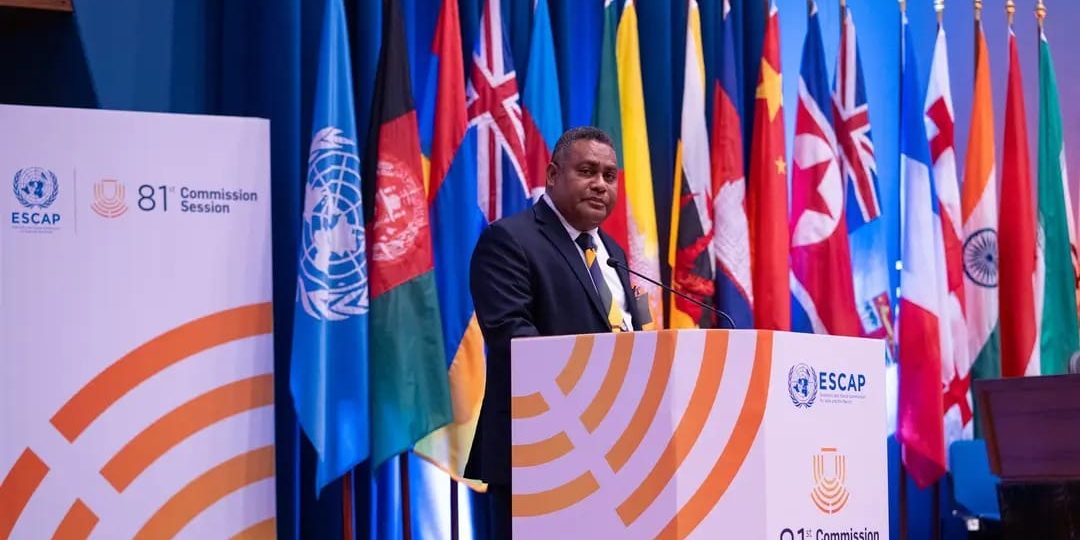Bangkok, Thailand – The Minister for National Planning and Development Coordination, Hon. Rexson Ramofafia, delivered an official statement at the 81st Session of the United Nations Economic and Social Commission for Asia and the Pacific (UN ESCAP), held in Bangkok.
In his address, Minister Ramofafia emphasized the urgency of enhanced regional cooperation to effectively address urbanization challenges and accelerate progress towards sustainable development, particularly for Small Island Developing States (SIDS).
The Minister commended ESCAP for convening under the timely theme, “Regional Cooperation for Resilient and Sustainable Urban Development,” a theme that strongly aligns with Solomon Islands’ national development priorities.
Minister Ramofafia highlighted critical urban challenges facing the Solomon Islands, including unplanned urban expansion, aging infrastructure, gaps in service delivery, and the growing risks posed by climate change. He noted that 27.6% of the national population now resides in urban areas—primarily in Honiara—where unmanaged urban growth has amplified social, economic, and environmental vulnerabilities.
Reaffirming the Government’s commitment to sustainable urban development, Minister Ramofafia outlined national efforts under the National Development Strategy (NDS) 2016–2035, which focuses on inclusive economic growth, improved service delivery, enhanced climate resilience, and balanced rural-urban development. However, he acknowledged that recent assessments indicate the country is off track in achieving most NDS objectives and Sustainable Development Goals (SDGs), calling for renewed national and international efforts to close these gaps.
On Key Initiatives to Advance Urban Sustainability, the Minister outlined several significant government-led initiatives including the National Urban Policy (2020–2035). Developed with support from UN-Habitat and ESCAP, this policy provides a framework for sustainable urban and peri-urban development, improved spatial planning, and equitable service delivery.
Minister Ramofafia said, the Solomon Islands Building Code Bill is under parliamentary review. This legislation aims to enhance standards for climate-resilient, safe, and affordable housing, particularly in informal settlements.
On Sustainable Human Settlements Development, a strategic priority under the NDS is to ensure all citizens have access to basic services and secure shelter. Solomon Islands appreciates ESCAP’s continued support in this area.
Minister Ramofafia expressed gratitude for ESCAP’s technical and financial support in several critical areas, including:
Review of the Solomon Islands Project Planning Manual (2022)
Development of the Second Voluntary National Review on the SDGs (2024)
Finalization of the LDC Smooth Transition Strategy (2025)
Support for climate finance readiness, trade facilitation, and statistical capacity-building
Call for Enhanced Regional Collaboration
The Minister reiterated Solomon Islands’ strong commitment to multilateralism and regional solidarity, calling for deeper cooperation in areas such as trade, infrastructure development, climate resilience, and digital connectivity. He stressed the importance of continued support for SIDS to overcome structural challenges and realize the ambitions of the 2030 Agenda.
Solomon Islands reaffirm its commitment to regional cooperation through ESCAP and call for increased collaboration to build a resilient, inclusive, and sustainable urban future for our region, said Minister Ramofafia.
- OPMC









